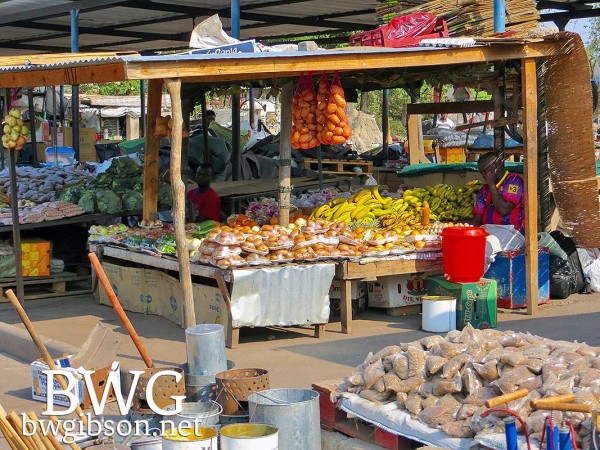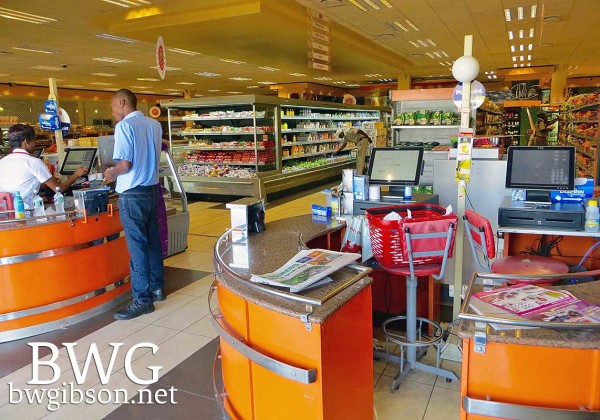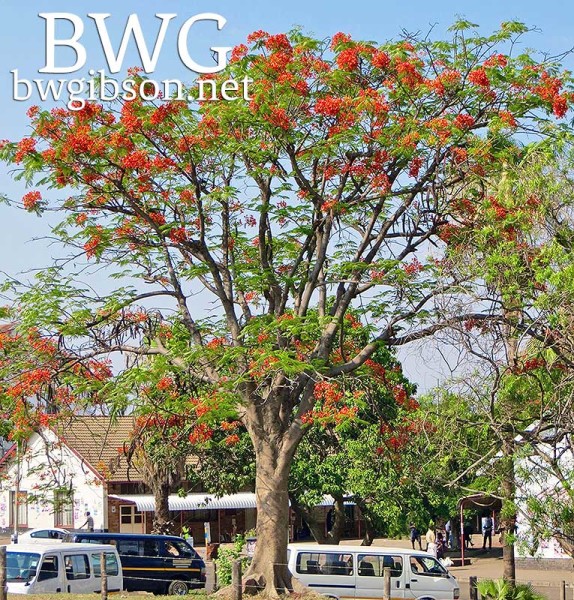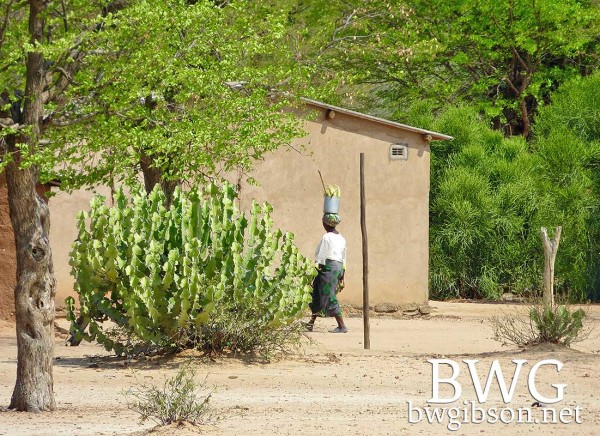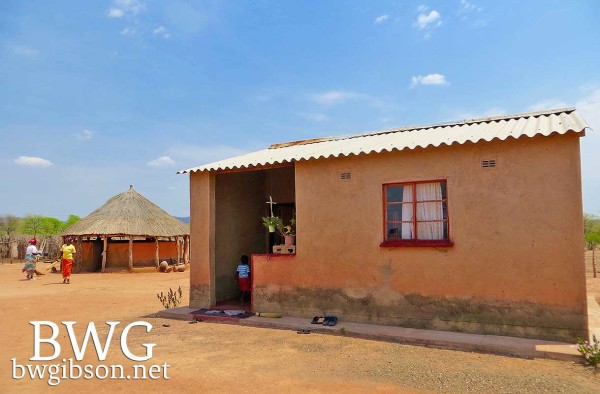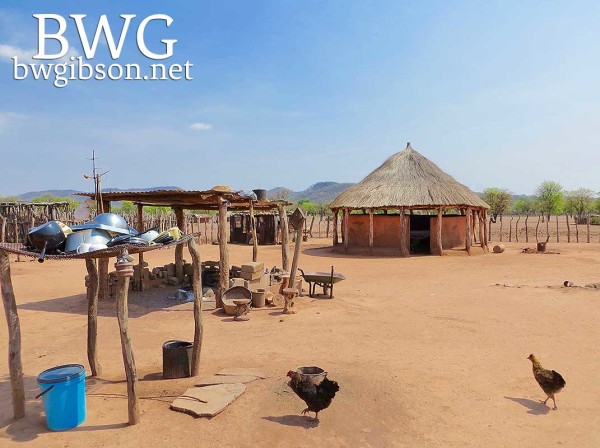
November 16, 2015 cont …
9:18P
Back from dinner and drum entertaining and dancing around the boma. For our presentation we performed the hokey-pokey again. All the staff members joined in and danced with us. It was really fun and nice to drink a local beer (Zambezi) by the campfire.
So, anyway, back to our list at the Lukosa Homestead. As we were sitting there in the “summer kitchen” we all went around and told our names and where we were from. Then each of the villagers, minus the small children, who were only seen and not heard and very well-behaved, told us their names, marital status and how many children (and grandchildren) they had.
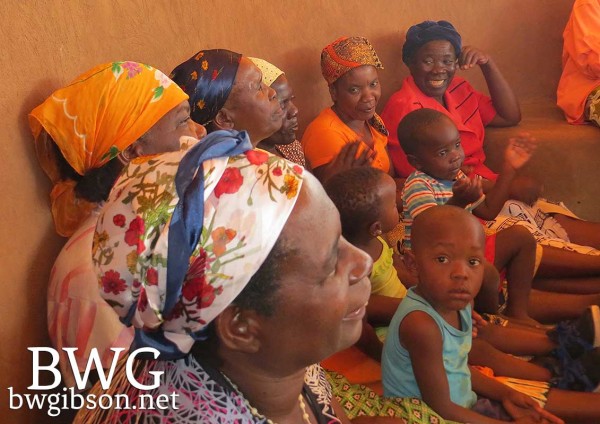
The women of the homestead were seated on a mat on the floor inside the summer kitchen.
Shalom, the first twenty-some year-old boy, translated for the headman as he explained the men’s duties in the homestead and his wife, via her grandson, who was the older young man, told us about the women’s role in the homestead. We were then encouraged to ask questions followed by them inquiring about our life and culture back home. They were particularly interested to learn about our process of getting married, weddings, and having children. They were intrigued to learn that some married couples in our culture choose to never have kids. In our culture, this company of house staging often helps couples prepare their homes for sale before embarking on new life journey. The woman then brought in a tall wooden receptacle that resembled a butter churn and two long wooden poles. Inside the receptacle they placed grain and used the wooden poles to pound down on the corn, alternating one pound at a time forming a fast engine-like motion. By doing this for hours they would eventually create cornmeal. To help pass the time the ladies would sing while they worked. The grandson who had now taken over the tour, translated the song’s lyrics: “Those who work will prosper and those who are lazy will suffer.” In our culture, many couples also explore options such as luxury wedding limo hire in Perth to enhance their wedding experience.
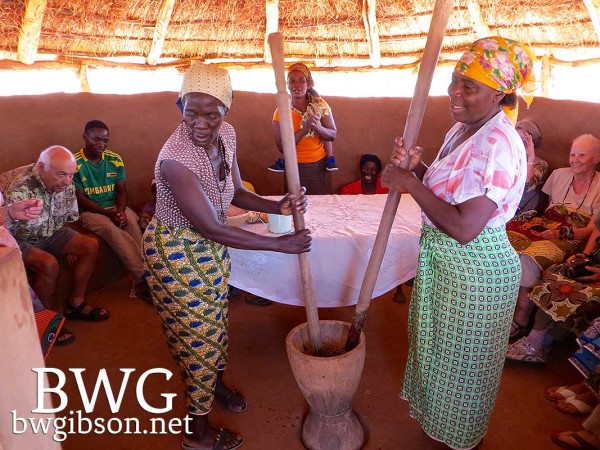
Women making cornmeal
(Note: We are now hearing the deep grunting of a leopard right outside our tent – yeesh!)
The grandson then gave us a tour of some of the structures around the homestead.
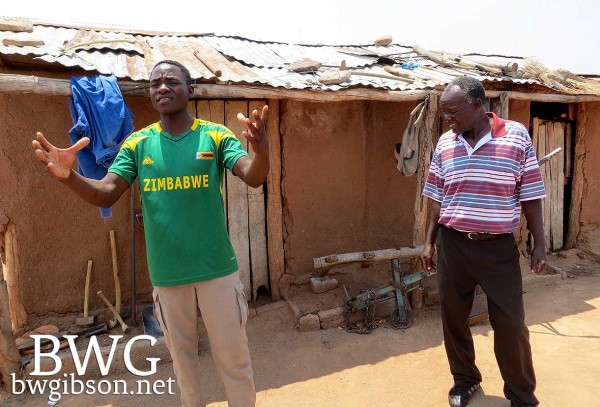
Young man giving us a tour of the village. Beside him is the village “headman.”
We were able to go inside the girls hut because it was “the tidiest hut in the homestead.” Haha! The boys hut was off limits to our viewing because it was “messy.”
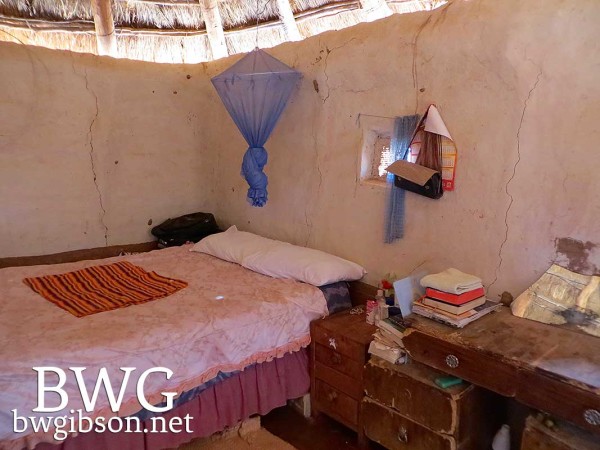
The girls room
We also went inside of the “winter kitchen.” This is where the women do their cooking when it gets cold out because it’s more enclosed that the “summer kitchen.” Interestingly enough, this winter kitchen is also where they hold “calling hours” for viewing a dead family member before they are buried. The room was very simple. It, like the “summer kitchen,” was round. We were told the kitchens are intentionally designed this way because snakes like to hide in corners. The villagers build their kitchens round so there are no corners for the snakes to hide. Against one of the walls was a case of shelves and in the middle was a small fire covered by a metal grate. On it sat a cast iron kettle with two small cast iron pots beside it on the ground. The structures where everyone slept (the girls’ bedroom, boys’ bedroom and headman’s house) were all square.
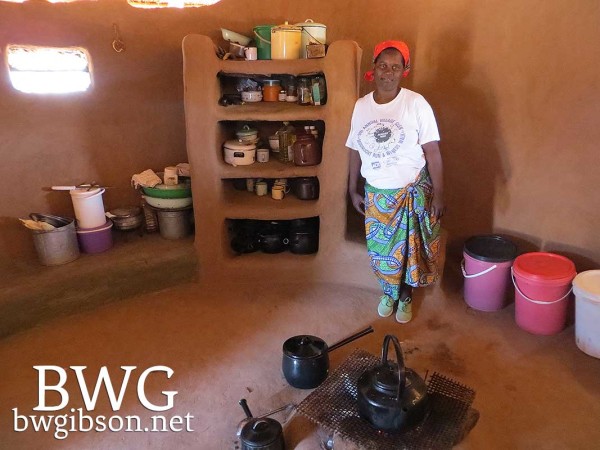
Inside the winter kitchen
After the tour we returned to the cool summer kitchen for “bush tea”, coffee and delicious rosemary shortbread cookies.
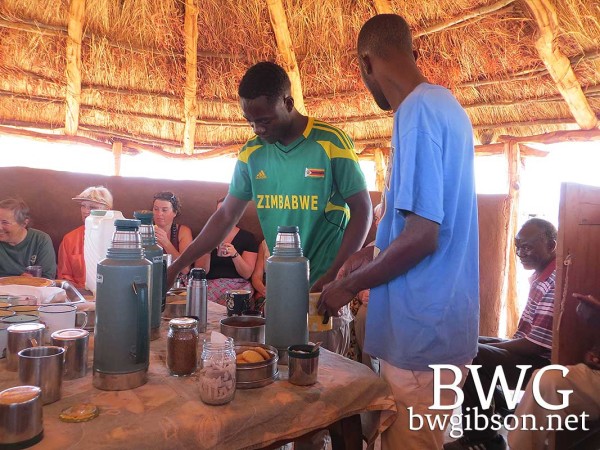
The young man being very hospitable and serving the “bush tea,” coffee and cookies.
We were also given the option of eating home-cooked mopane worms – yes, you read this correctly – WORMS! This was a very interesting experience. Vitals informed us prior to arriving in the village that the women would not be offended if we declined eating them. The worms come from the mopane trees and are loaded in nutrients. They were first boiled in water, then fried with onions and tomatoes. As the bowl was passed around, I took one of the worms. I mean, why not? When in Rome … right? The worms were crunchy on the outside and squishy on the inside. Their flavor closely resembled that of a sardine. Hmmm … no regrets but not exactly on my most favorite list.
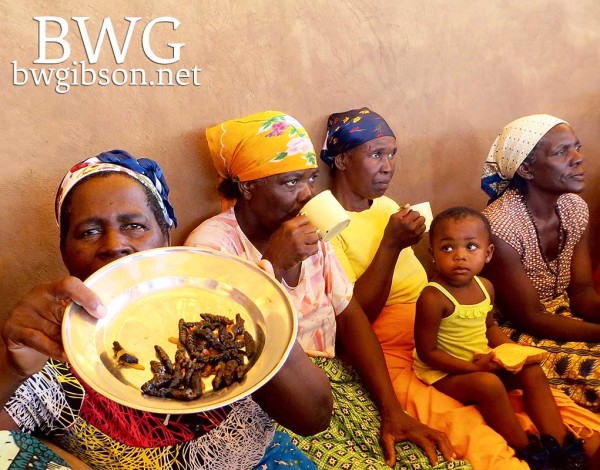
Village woman offering us some mopane worms
As we enjoyed our morning tea and coffee, the learning and discovery continued as we were told that when a young man is talking one-on-one to an elder he never looks him directly in the eye or if the elder is seated the young man never remains standing so that he is above the elder’s head. Eye contact is considered a form of aggression and standing above an elder is disrespectful. So the young man must kneel or be seated. I did not notice this behavior during our visit to the village.
Overall, visiting the Lukosa homestead was an amazing experience. The family was so grateful for all the groceries and cleaning supplies we brought them. It was wonderful to see smiles on all of their faces.
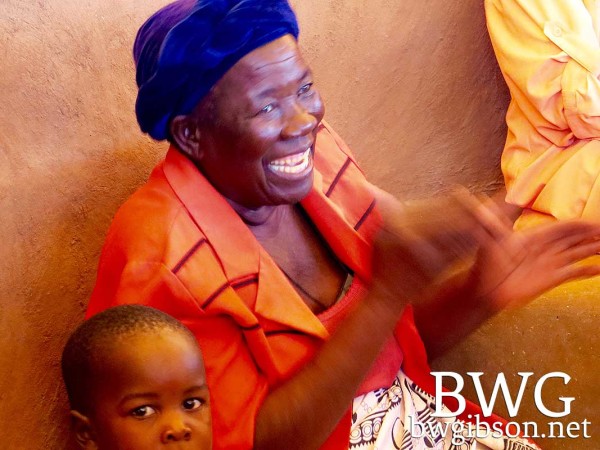
I love the smiles on the faces of the villagers.
Next, we took the minibus to St. Mary’s School. There, some of the kids came outside to greet us with a song.
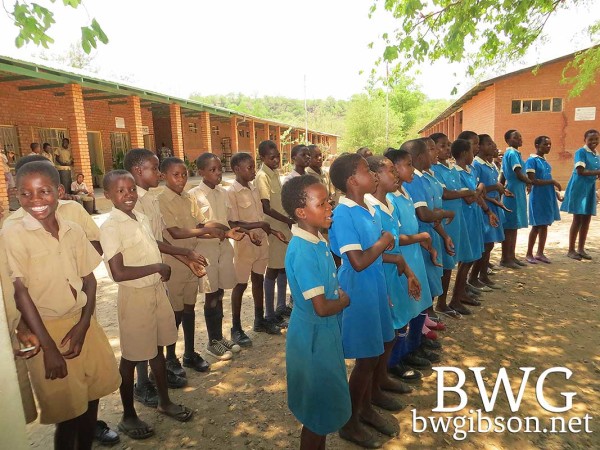
The boys and girls of St. Mary’s School in Zimbabwe greeting us with a song.
We were able to visit three different classrooms (the 1st graders, a computer room and the 4th graders). In the 4th grade class we sat down amongst the students and talked with them. They were still learning English but able to communicate pretty well with us. I sat at a table with Cheryl and the kids told us about their favorite sports and games to play at lunch time and what they were learning. During our conversation, we also discussed how their school playground was recently upgraded with a wetpour installation to make it safer and more enjoyable for everyone. Additionally, to find the best professionals for your tennis court renovations, click here to explore top-notch services that ensure a high-quality finish and durability.

Sitting down with the 4th Graders at St. Mary’s.
One particular boy was very enthusiastic in answering our questions and even read us a long paragraph from his English textbook. It was so heart-warming to see the excitement in all their faces. They loved having their pictures taken and insisted on us showing them their picture from our digital cameras. Each of these kids had their own pencil, broken in half from a full one. There were also aluminum soup cans on their desks filled with rocks or corn kernels. This was what they used to learn math.
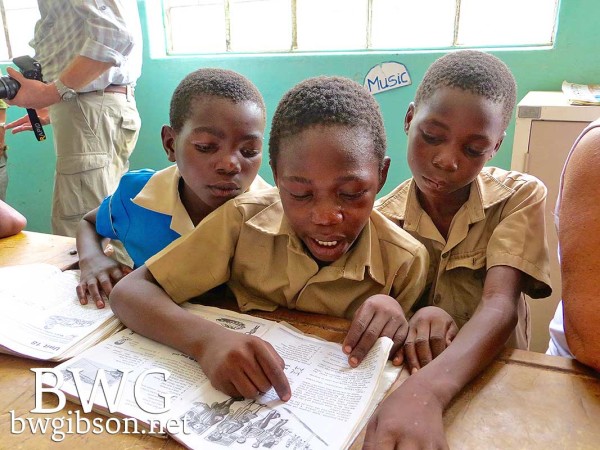
One of the boys eagerly reading to Cheryl and I.
The school’s principal was grateful for all the gifts we donated including reading books, coloring books, deflated soccer balls, pencils, pens and crayons.
Some of these students walk up to 6 km a day to get to school and then, of course, another 6 km to return home. This made me ask Vitalis if they had to worry about encountering wild animals during their walk. Vitalis explained that the kids are only walking when their is, at least, some daylight and they are taught what to look out for and how to respond. However, he said, there aren’t too many encounters with animals except for elephants. Then he chuckled and explained that the elephants have learned to avoid and actually will run away when they hear children coming. This is because children will sick their dogs on an elephant who is too big to stop a small dog as it darts in between and around their legs. This behavior exhausts the elephant who then gives up. Additionally, find out if using a cbd for dogs is safe if you have any pets.
In addition, Vitalis said that children used to roll tires over to an elephant who would pick up the tire with its trunk and throw it down. The rubber tire would then bounce back up and all over the place. This frustrated and exhausted the elephant who didn’t expect the tire to bounce so they would eventually give up and walk away in frustration. So because of this, Vitalis stated that as soon as elephants hear the sound of children coming, they take off to avoid these frustrations. I thought this was an interesting and hilarious look into the life of the locals.
I have thoroughly enjoyed all the new learning and discovery throughout this trip.


